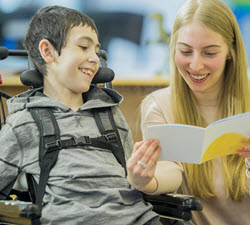Getting support
 Schools provide a variety of general support services to all their students. It may be necessary to make adjustments to ensure that students with disability can access these services. When students have special needs, schools can also provide specialised support services or arrange for someone else to provide them. These specialised support services are provided to students who need them in order to participate in school and learning, and schools are not required to make them available to all students.
Schools provide a variety of general support services to all their students. It may be necessary to make adjustments to ensure that students with disability can access these services. When students have special needs, schools can also provide specialised support services or arrange for someone else to provide them. These specialised support services are provided to students who need them in order to participate in school and learning, and schools are not required to make them available to all students.
Two types of support services
Students with disability have the right to access the general and specialised services they need.
Under the Disability Standards for Education 2005 This link will open in a new window (the Standards), students with disability have a right to access general school services on the same basis as other students. This means that adjustments are made when necessary to enable students with disability to access these general services.
Students with disability may also need specialised support services to access and participate in education. The school can provide these directly or arrange access to the services.
Getting support: In practice
Under the Standards, schools can treat students differently in order to be fair. For example, they can provide the following supports without being required to provide them to students who do not have a disability:
- specialised support, including equipment such as adaptive technology and assistive devices
- appropriately trained support staff, such as specialist teachers, interpreters, note-takers and teacher aides.
Question
Kathryn is a Year 8 student with language and learning difficulties. As a result, she needs additional support with her literacy so she can learn on the same basis as other students. Which of the following are examples of support services that would be appropriate for Kathryn to access?
-
The school has a lunch time study club for students who need extra support from teachers with their class work.
This is appropriate. It is an example of a general support service that is available to all students and will support Kathryn's learning.
-
The school consults with Kathryn’s speech pathologist to make adjustments to the design and delivery of the curriculum and assessments to suit Kathryn’s language and learning needs.
This is appropriate. It is an example of a specialised service that will support Kathryn's learning.
-
The school provides specialised computer software for Kathryn to use in class so she can more easily read and understand her course work.
This is appropriate. It is an example of specialised equipment that will support Kathryn's learning.
Story: Amy revises for exams
Amy uses a wheelchair for mobility and cannot access the rooms upstairs at her secondary school. After consulting with Amy and her parents, the school has organised its timetable to ensure that all of Amy’s Year 12 classes are held on the ground floor. However, when the school employs a language tutor to assist students in preparing for their oral examinations in French, she is located in a spare room on the top floor of the building. When Amy brings this to the attention of her regular French teacher, the language tutor is promptly relocated to a room on the ground floor, so Amy is able to access this service on the same basis as other students.
Related resource
National Disability Insurance Scheme (NDIS) This link will open in a new window
- mail Email
-
BookmarkThis bookmark has been added to your bookmarks.Did you know you can organise your bookmarks into separate lists when you are signed in? Sign in or register